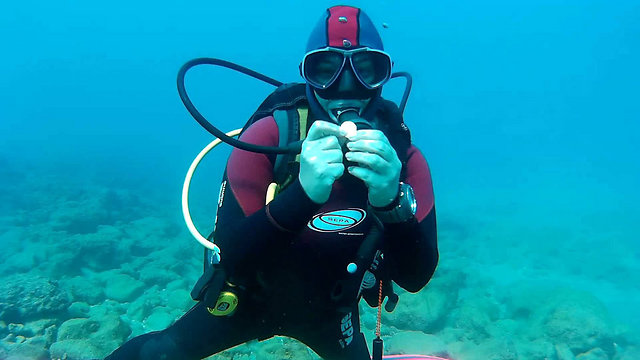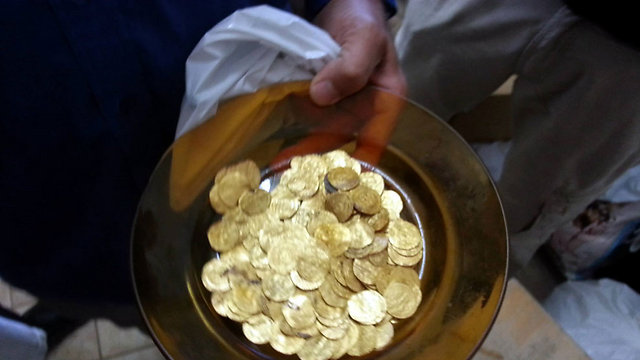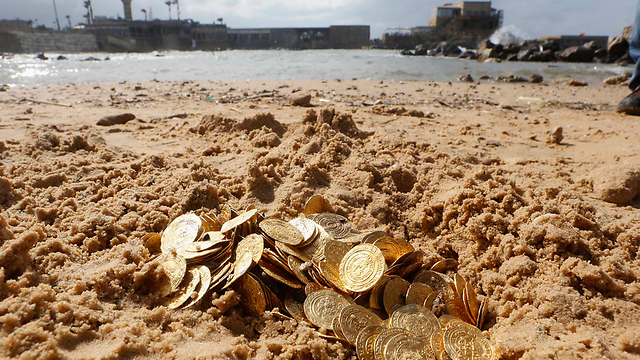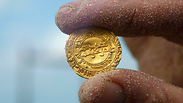
"I saw two of my friends lingering behind, digging and kicking up dust. They showed me there were coins there. I picked up a handful of sand and discovered more coins. We worked until we ran out of air," said Avivit Fishler from Haifa, who was among the group of divers who uncovered a hoard of gold coins near Caesarea. The treasure, Fishler said, was discovered during a routine dive, two weeks ago.
"We are a group who dives regularly together and there were six of us who went to dive at the ancient harbor," Fishler said. "We talked about the fact that the sea was going to rise and we wanted to take advantage of the time while we had it. We said we would to our usual route, and then decided to move towards the breakwater to see if anything interesting was exposed after the storm."
After Fishler and her friends found the coins, they waded to the beach. "We covered up the coins with sand and placed a plastic jug we found in the water nearby to mark the spot."
The divers then alerted the Israel Antiquities Authority (IAA) of their find. A team of researchers arrived at the beach with a metal detector, and found "almost 2,000 gold coins in different denominations" circulated by the Fatimid Caliphate, which ruled much of the Middle East and North Africa from 909 to 1171. The divers were informed they had uncovered the largest treasure of gold coins ever found in Israel.
Robert Cole, an expert numismaticist with the IAA, said: “The coins are in an excellent state of preservation, and despite the fact they were at the bottom of the sea for about a thousand years, they did not require any cleaning or conservation intervention from the metallurgical laboratory. This is because gold is a noble metal and is not affected by air or water."
Kobi Sharvit, director of the marine archaeology unit at the Israel Antiquities Authority, said excavations would be carried out in the hope of shedding more light on the origin of the treasure.
He further added: "The discovery of such a large hoard of coins that had such tremendous economic power in antiquity raises several possibilities regarding its presence on the seabed. There is probably a shipwreck there of an official treasury boat which was on its way to the central government in Egypt with taxes that had been collected. Perhaps the treasure of coins was meant to pay the salaries of the Fatimid military garrison which was stationed in Caesarea and protected the city."
"Another theory is that the treasure was money belonging to a large merchant ship that traded with the coastal cities and the port on the Mediterranean Sea and sank there," he said.
The Israeli Antiquities Authority declined to put a cash value on the coins, which it said had been exposed as a result of winter storms.
The find was "so valuable that its priceless," spokeswoman Yoli Schwartz said, adding the haul was now the property of the state, and that there was no finder’s fee.
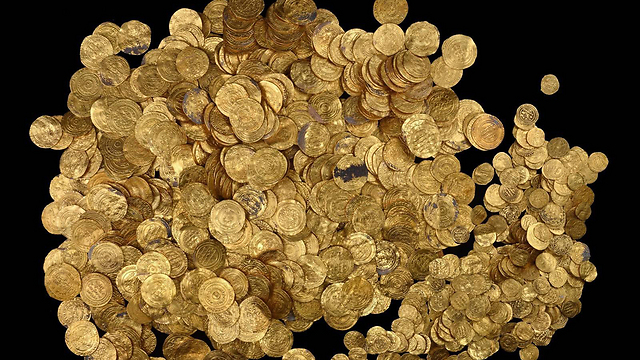
An IAA statement cited Sharvit as saying that the divers who found the treasure and reported it (Tzvika Feuer, Kobi Tweena, Avivit Fishler, Yoav Lavi and Yoel Miller) were "model citizens."
"They discovered the gold and have a heart of gold that loves the country and its history," the statement quoted Sharvit as saying.
"The Law of Antiquities states that all antiquities belong to the state and that not reporting or removing antiquities from their location, or selling or trading them is an offense punishable by up to five years imprisonment. In this case the divers reported the find; but in many instances divers take the objects home and that way extremely important archaeological information is lost forever, which cannot be recovered," Sharvit said.
"Therefore the discovery of the treasure underscores the need to combine the development of the place as a tourism and diving site with restrictions that will allow the public to dive there only when accompanied by inspectors or instructors from the diving club."














